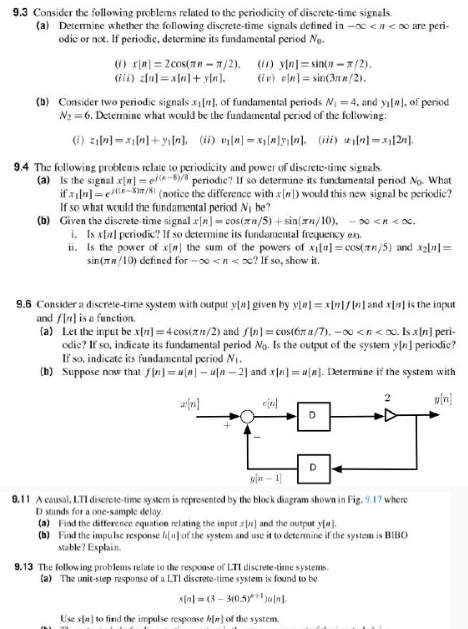Consider the following problems related to the periodicity of discrete-time signals. (a) Determine whether the following discrete-time signals defined in -∞ < n < ∞ are periodic or... Consider the following problems related to the periodicity of discrete-time signals. (a) Determine whether the following discrete-time signals defined in -∞ < n < ∞ are periodic or not. If periodic, determine its fundamental period. (b) Consider two periodic signals x1[n] of fundamental periods N1 = 4, and x2[n] of period N2 = 6. Determine what would be the fundamental period of the following: (i) z[n] = x1[n] + y1[n], (ii) z[n] = x1[n] * x[n], (iii) z[n] = x1[n] * x2[n].

Understand the Problem
The question involves determining whether specific discrete-time signals are periodic, and if so, finding their fundamental periods. It also involves analyzing a discrete-time system in relation to its input and output. The problems require knowledge of signal processing and the properties of periodic functions.
Answer
12
For (b)(i), the fundamental period of z[n] = x1[n] + x2[n] is 12. For (b)(ii) and (b)(iii), if z[n] = x1[n] * x2[n], the fundamental period remains 12.
Answer for screen readers
For (b)(i), the fundamental period of z[n] = x1[n] + x2[n] is 12. For (b)(ii) and (b)(iii), if z[n] = x1[n] * x2[n], the fundamental period remains 12.
More Information
The fundamental period of two periodic signals added or multiplied is the least common multiple (LCM) of their periods. For N1 = 4 and N2 = 6, LCM(4, 6) = 12.
Tips
A common mistake is not calculating the LCM correctly or forgetting that both addition and multiplication of periodic signals require finding the LCM for the new period.
AI-generated content may contain errors. Please verify critical information